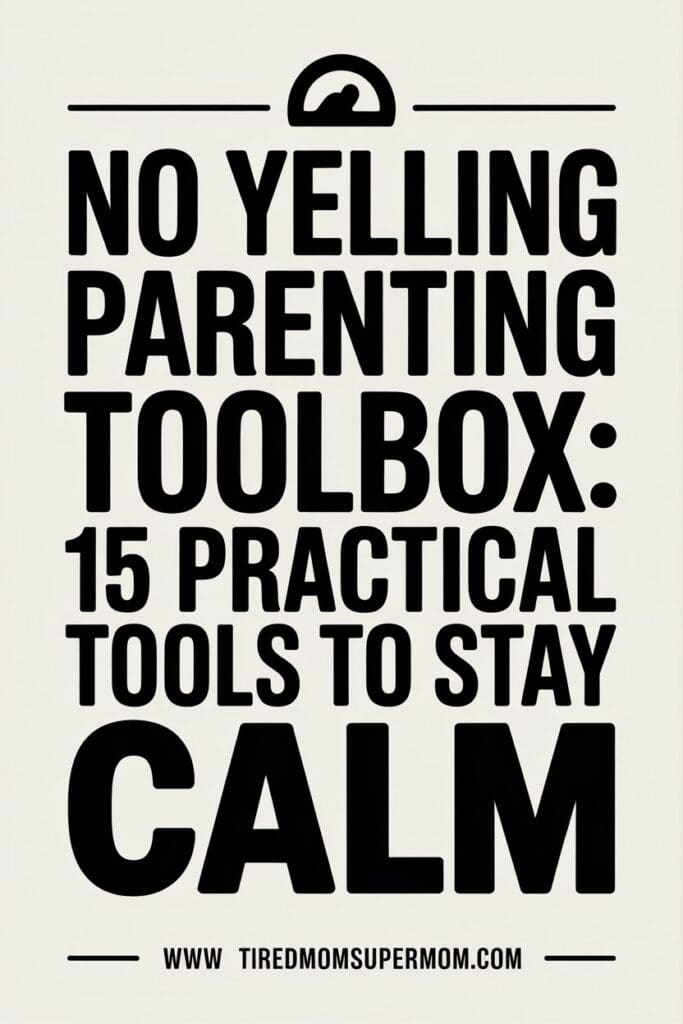No Yelling Parenting Toolbox: 15 Practical Tools to Stay Calm
Parenting can push anyone to their limits. After all, raising little humans—while incredibly rewarding—is undeniably stressful. You might have the best intentions to stay calm, but inevitably, stressful moments arise, tempers flare, and yelling happens. The good news? It doesn’t have to be this way.
That’s why I’ve put together this no yelling parenting toolbox, filled with 15 actionable, practical strategies that can help you maintain composure, enhance emotional connections with your kids, and create a more peaceful home.
Whether you’re naturally calm or you’re an overwhelmed mom working towards serenity (see more tips for introvert moms here), these tools can truly transform your day-to-day interactions.
This post may contain affiliate links. Full privacy policy and disclosure here.
Why Do Parents Yell Anyway?
Before diving into the toolbox, let’s explore the reasons behind yelling. Typically, yelling happens because you’re overwhelmed, tired, or simply unsure how to effectively communicate your needs and expectations. Understanding these triggers is crucial in overcoming them.
Yelling isn’t effective—it may stop behavior temporarily, but it damages trust and teaches children yelling is acceptable. What can we do instead? Let’s dive into the solutions.

Your No Yelling Parenting Toolbox: 15 Practical Tools
1. Mindfulness and Breathing Exercises
Practicing mindfulness helps you remain calm during stressful situations. Quick breathing techniques can dramatically shift your reaction from yelling to peaceful communication. Teach these methods to your kids too! (Here’s how)
- Recommended Tool: Mindfulness Cards
2. Set Up a Calm Corner
Designate a calm corner for yourself and your kids to retreat and reset when emotions run high. Fill it with soft cushions, calming toys, books, or sensory bottles.
- Recommended Tool: Calming Sensory Bottles
3. Use Positive Reinforcement Charts
Visual reinforcement charts reward good behavior, proactively reducing triggers for yelling.
- Recommended Tool: Magnetic Responsibility Chart
Adding these strategies from the no yelling parenting toolbox into your daily routine will gradually help you maintain calm during stressful parenting moments.
4. Clear Expectations and Boundaries
Clarify your expectations in advance. Clear rules reduce confusion and conflict, keeping everyone calmer.
5. Emotional Regulation Techniques
Learn to identify and manage your emotions. Techniques like counting backward or naming feelings aloud can help prevent impulsive yelling.
6. The Whisper Technique
Speak softly instead of yelling. Kids often mirror your tone—whispering encourages them to quiet down to listen.
7. Bring Humor into Situations
Using humor can break the tension and reestablish connection, transforming potential yelling moments into laughter.
8. Scheduled Parental Breaks
Take small breaks to decompress daily. Whether it’s five minutes for tea or a quick walk, breaks help regulate your stress levels.
This complete no yelling parenting toolbox isn’t just for when things go wrong—it’s for building daily habits that keep your home environment calm and supportive.
9. Non-Verbal Communication
Develop silent signals, like gentle hand gestures, to express disappointment or remind your kids of rules without raising your voice.
10. Give Yourself a Parent Time-Out
Just like kids, sometimes parents need a time-out to reset emotions and reactions.
11. Reflective Journaling
Write about stressful parenting moments and reflect on better handling techniques, enhancing emotional regulation skills.
- Recommended Tool: Mom’s One Line a Day Journal
12. Teach Kids Conflict Resolution
Empower kids by teaching them early conflict resolution skills. They’ll handle disagreements better, reducing stress and yelling in your home.
Having a reliable no yelling parenting toolbox on hand is one of the most empowering things you can do for your mental health as a mom.
13. Regular Family Meetings
Open communication prevents misunderstandings. Structured family meetings (grab our template here) strengthen family bonds and cooperation.
14. Visualization for Stress Management
Visualize calm responses to stressful scenarios, training your mind to default to peaceful reactions instead of yelling.
15. Positive Affirmations
Regularly repeat calming affirmations to strengthen your ability to maintain composure under stress. Try affirmations like “I am calm” or “I choose peace.”
Remember, the key to success with your no yelling parenting toolbox is consistency and patience.
💡 Ready to Yell Less and Connect More?
Parenting doesn’t have to be filled with stress, guilt, or raised voices. With the right tools, you can handle the chaos with calm and confidence.
🎁 Download your free No Yelling Parenting Toolbox—a printable guide packed with practical strategies to help you stay grounded, even on the toughest days.
👉 Click here to grab your printable toolbox now and start your calm parenting journey!
Because peaceful parenting starts with preparation—and it all begins with your toolbox. 🧰💕

Incorporating Calm Parenting into Your Busy Life
You might think these strategies are difficult to integrate into your busy daily life, especially if you’re balancing multiple responsibilities. (Get organizing hacks for busy moms here). The beauty of this no yelling parenting toolbox is its flexibility—use one or two tools consistently, and you’ll see meaningful improvements.
As a stay-at-home mom (here’s how to stay happily busy), incorporating these tools in manageable ways can ease your stress, improving your family dynamics significantly.
Every parent can benefit from a no yelling parenting toolbox, especially during high-stress seasons like back-to-school transitions or bedtime chaos.
Keep Yourself and Your Kids Happier
A calmer approach benefits everyone. Children feel safer and understood, and you feel less overwhelmed, becoming a happier mom overall (learn more about cultivating happiness here). Remember, your wellbeing is essential in maintaining a peaceful home.
By regularly revisiting and refreshing your no yelling parenting toolbox, you’ll strengthen your ability to manage your emotions and create lasting peace at home.
Encouraging Positive Activities
Sometimes redirecting energy into fun activities can diffuse stress before it arises. Whether it’s exploring new hobbies (ideas here) or spending quality one-on-one time, these activities foster calm and strengthen family relationships.
For those special moments with your sons, consider capturing them with fun quotes for your memories (ideas for boy moms here).
When stressful situations arise, turning immediately to your no yelling parenting toolbox can help you respond calmly instead of impulsively.
FAQ: No Yelling Parenting Questions Answered
How long does it take to see results from these no yelling parenting tools?
Most parents notice improvements within a few days to weeks with consistent practice.
What if I slip up and yell again?
It’s normal! Give yourself grace and simply reset. Consistency, not perfection, creates lasting change.
Are these tools practical for single parents too?
Absolutely—these tools are flexible and beneficial in all family situations.

Understanding the deeper psychology behind mindful parenting can further enhance your parenting toolbox. For more insights on this, you can explore Psychology Today’s guide to mindful parenting.
Additionally, developing strong emotional regulation skills is crucial for both parents and children. For expert-backed emotional regulation strategies, check out resources from the Child Mind Institute.
The more familiar you become with each strategy in your no yelling parenting toolbox, the easier it will be to maintain peace and composure during difficult parenting moments.
📌 Pinterest Call-to-Action:
“Tired of yelling? Save these 15 powerful no yelling parenting tools to your board and build a calm, connected family!”

